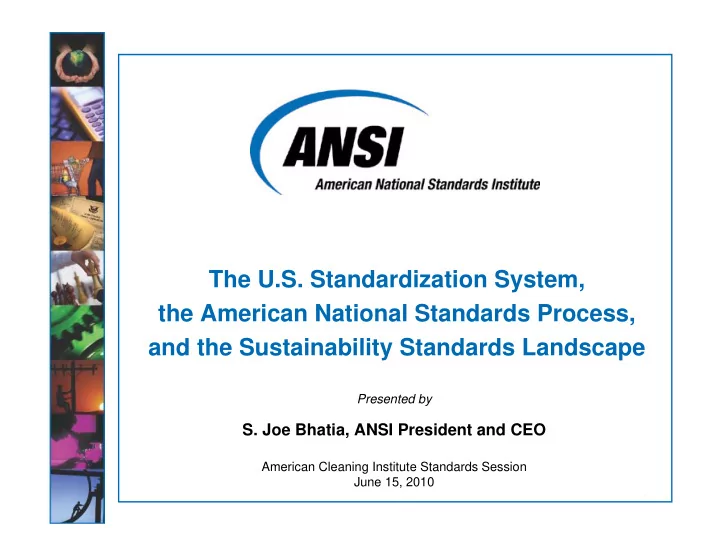

The U.S. Standardization System, the American National Standards Process, and the Sustainability Standards Landscape Presented by S. Joe Bhatia, ANSI President and CEO American Cleaning Institute Standards Session June 15, 2010 1
2 Overview: The U.S. Standards and Conformity Assessment System
U.S. Standardization System a market driven approach In the U.S. alone, there are more than one hundred thousand standards These documents are being developed by: standards developing organizations (SDOs) over 500 consortia thousands of committees Over 9,500 approved American National Standards American Cleaning Institute Standards Session June 15, 2010 | Washington, DC Slide 3
U.S. Standardization System reliable – flexible – responsive Market driven Flexible and sector-based Partnership between public and private sectors This system is designed to . . . Support a broad range of stakeholder engagement Address emerging priorities and new technologies Allow stakeholders to find the solutions that best fit their needs As defined in the United States Standards Strategy www.us-standards-strategy.org American Cleaning Institute Standards Session June 15, 2010 | Washington, DC Slide 4
U.S. Conformity Assessment System reliable – flexible – responsive The National Conformity Assessment Principles (NCAP) for the United States document explains key aspects of compliance verification. The NCAP is a guidance document that can be considered in conjunction with the United States Standards Strategy (USSS). National Conformity Assessment Principles for the United States www.ansi.org/ncap American Cleaning Institute Standards Session June 15, 2010 | Washington, DC Slide 5
What Is ANSI? The American National Standards Institute leads standards, conformity assessment and related activities in the United States. Founded in 1918, ANSI is a private, non-profit organization. ANSI is not a government agency or a standards developer. ANSI’s mission . . . to enhance the global competitiveness of U.S. business and the American quality of life by promoting and facilitating voluntary consensus standards and conformity assessment systems and ensuring their integrity. American Cleaning Institute Standards Session June 15, 2010 | Washington, DC Slide 6
What Are ANSI’s Roles? Represents U.S. globally Offers neutral forum Accredits standards Ensures integrity of the developers and conformity standards and conformity assessment organizations assessment system Approves American Provides central resource National Standards for information and education Protects public interest in standards and compliance American Cleaning Institute Standards Session June 15, 2010 | Washington, DC Slide 7
ANSI Accreditation of Standards Developing Organizations and the American National Standards (ANS) Process 8
SDO Accreditation Overview ANSI fosters the U.S. standardization system by accrediting the procedures of standards developing organizations (SDOs) and subsequently approving individual documents as American National Standards (ANS) More than 220 accredited SDOs Over 9,500 approved ANS Accreditation is a pre-condition for submission of a candidate ANS to ANSI for approval Learn more: www.ansi.org/ansvalue American Cleaning Institute Standards Session June 15, 2010 | Washington, DC Slide 9
What Are the Advantages of Accreditation? Indicates quality, credibility, consensus, and an open standards development process Increases market efficiency Provides some legal insulation Maximizes market and regulatory acceptance American Cleaning Institute Standards Session June 15, 2010 | Washington, DC Slide 10
What Are the Essential Requirements of Accreditation? Due process Openness Balance Consensus Public review Appeals American Cleaning Institute Standards Session June 15, 2010 | Washington, DC Slide 11
12 Standards Landscape The Sustainability
ANSI Workshop: Toward Product Standards for Sustainability April 8-9, 2009 Organized by ANSI with support from U.S. EPA 240 in-person attendees; 100+ via webinar 65-page workshop report contains a complete summary Visit ansiposts.ansi.org American Cleaning Institute Standards Session June 15, 2010 | Washington, DC Slide 13
What Are the Needs? Terms like “green” and “socially responsible” subject to varied interpretations in the marketplace Product standards and criteria help establish uniform technical requirements, methods, processes, and practices that address sustainability Shades of green : many existing standards and labels/ certification marks already exist How do consumers, government, and industry know which to use? American Cleaning Institute Standards Session June 15, 2010 | Washington, DC Slide 14
Who Is Developing Sustainability Standards? Over 50 organizations and government agencies . . . and that’s just the ones we know about! MTS ACC CSA America NAHB ACMA CSI NAHSA AFPA ECCB NIOSH AHAM Green Blue Institute NSF International AHRI Greenguard Envir. Inst. OPEI AIHA Green Seal Renewable Fuels Assoc. ASABE IAPMO SMACNA ASHRAE ICC TAPPI ASME IEC Toy Industry Assoc. ASSE IES UL ASTM International IEEE U.S. Dept. of Agriculture AWWA ISO U.S. EPA BIFMA International Leonardo Academy U.S. Green Building Council Canadian Wood Council MACTEC American Cleaning Institute Standards Session June 15, 2010 | Washington, DC Slide 15
Key Workshop Findings Pros and cons to each kind of standards development – proprietary, consensus-based, and government regulation Government regulations can set the floor and voluntary standards can raise the ceiling Need for an overarching body to coordinate and guide the process Need consistent and globally-accepted nomenclature and terminology Terms like “attribute” and “label” are being interpreted differently by consumers, standards developers, government, and industry American Cleaning Institute Standards Session June 15, 2010 | Washington, DC Slide 16
Key Workshop Findings (continued) Standards should be clearly written so they can be effectively used for reliable certification Single-attribute standards vs. multi-attribute standards Uniformity and transparency needed about the degree to which a product addresses sustainability concerns Reduce consumer confusion American Cleaning Institute Standards Session June 15, 2010 | Washington, DC Slide 17
For more information American National Standards Institute Headquarters Operations 1819 L Street, NW 25 West 43rd Street Sixth Floor Fourth Floor S. Joe Bhatia President and CEO Washington, DC 20036 New York, NY 10036 202-293-8020 jbhatia@ansi.org T: 202.293.8020 T: 212.642.4900 F: 202.293.9287 F: 212.398.0023 www.ansi.org | webstore.ansi.org | www.nssn.org American Cleaning Institute Standards Session June 15, 2010 | Washington, DC Slide 18
Recommend
More recommend